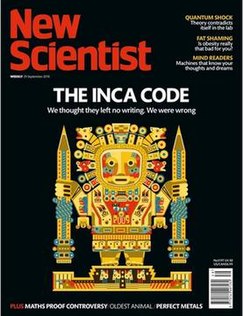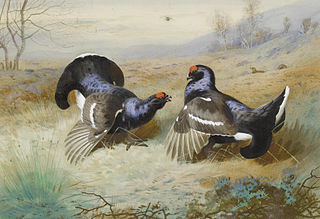
Darwinism is a theory of biological evolution developed by the English naturalist Charles Darwin (1809–1882) and others, stating that all species of organisms arise and develop through the natural selection of small, inherited variations that increase the individual's ability to compete, survive, and reproduce. Also called Darwinian theory, it originally included the broad concepts of transmutation of species or of evolution which gained general scientific acceptance after Darwin published On the Origin of Species in 1859, including concepts which predated Darwin's theories. It subsequently referred to the specific concepts of natural selection, the Weismann barrier, or the central dogma of molecular biology. Though the term usually refers strictly to biological evolution, creationists have appropriated it to refer to the origin of life, and it has even been applied to concepts of cosmic evolution, both of which have no connection to Darwin's work. It is therefore considered the belief and acceptance of Darwin's and of his predecessors' work—in place of other theories, including divine design and extraterrestrial origins.
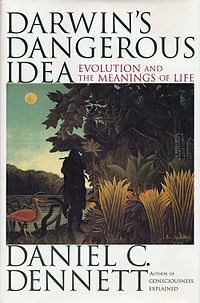
Darwin's Dangerous Idea: Evolution and the Meanings of Life is a 1995 book by Daniel Dennett, in which the author looks at some of the repercussions of Darwinian theory. The crux of the argument is that, whether or not Darwin's theories are overturned, there is no going back from the dangerous idea that design might not need a designer. Dennett makes this case on the basis that natural selection is a blind process, which is nevertheless sufficiently powerful to explain the evolution of life. Darwin's discovery was that the generation of life worked algorithmically, that processes behind it work in such a way that given these processes the results that they tend toward must be so.
A meme is an idea, behavior, or style that spreads from person to person within a culture—often with the aim of conveying a particular phenomenon, theme, or meaning represented by the meme. A meme acts as a unit for carrying cultural ideas, symbols, or practices, that can be transmitted from one mind to another through writing, speech, gestures, rituals, or other imitable phenomena with a mimicked theme. Supporters of the concept regard memes as cultural analogues to genes in that they self-replicate, mutate, and respond to selective pressures.
Memetics is the study of information and culture based on an analogy with Darwinian evolution. Proponents describe memetics as an approach to evolutionary models of cultural information transfer. Critics regard memetics as a pseudoscience. Memetics describes how an idea can propagate successfully, but doesn't necessarily imply a concept is factual.
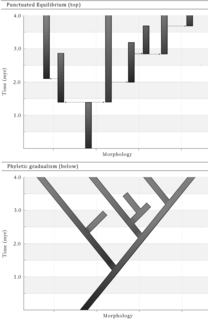
Punctuated equilibrium is a theory in evolutionary biology which proposes that once species appear in the fossil record the population will become stable, showing little evolutionary change for most of its geological history. This state of little or no morphological change is called stasis. When significant evolutionary change occurs, the theory proposes that it is generally restricted to rare and geologically rapid events of branching speciation called cladogenesis. Cladogenesis is the process by which a species splits into two distinct species, rather than one species gradually transforming into another.

Clinton Richard Dawkins, is an English ethologist, evolutionary biologist, and author. He is an emeritus fellow of New College, Oxford, and was the University of Oxford's Professor for Public Understanding of Science from 1995 until 2008.

Stephen Jay Gould was an American paleontologist, evolutionary biologist, and historian of science. He was also one of the most influential and widely read authors of popular science of his generation. Gould spent most of his career teaching at Harvard University and working at the American Museum of Natural History in New York. In 1996, Gould was hired as the Vincent Astor Visiting Research Professor of Biology at New York University, where he divided his time teaching there and at Harvard.

The Selfish Gene is a 1976 book on evolution by Richard Dawkins, in which the author builds upon the principal theory of George C. Williams's Adaptation and Natural Selection (1966). Dawkins uses the term "selfish gene" as a way of expressing the gene-centred view of evolution as opposed to the views focused on the organism and the group, popularising ideas developed during the 1960s by W. D. Hamilton and others. From the gene-centred view, it follows that the more two individuals are genetically related, the more sense it makes for them to behave selflessly with each other.

The Blind Watchmaker: Why the Evidence of Evolution Reveals a Universe without Design is a 1986 book by Richard Dawkins, in which the author presents an explanation of, and argument for, the theory of evolution by means of natural selection. He also presents arguments to refute certain criticisms made on his first book, The Selfish Gene. An unabridged audiobook edition was released in 2011, narrated by Richard Dawkins and Lalla Ward.
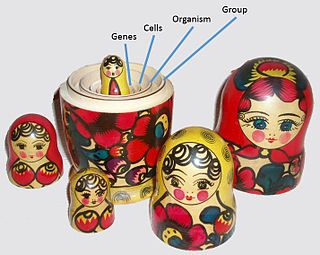
A unit of selection is a biological entity within the hierarchy of biological organization that is subject to natural selection. There is debate among evolutionary biologists about the extent to which evolution has been shaped by selective pressures acting at these different levels.
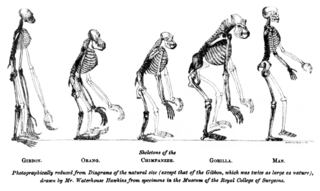
The gene-centered view of evolution, gene's eye view, gene selection theory, or selfish gene theory holds that adaptive evolution occurs through the differential survival of competing genes, increasing the allele frequency of those alleles whose phenotypic trait effects successfully promote their own propagation, with gene defined as "not just one single physical bit of DNA [but] all replicas of a particular bit of DNA distributed throughout the world". The proponents of this viewpoint argue that, since heritable information is passed from generation to generation almost exclusively by DNA, natural selection and evolution are best considered from the perspective of genes.

David Sloan Wilson is an American evolutionary biologist and a Distinguished Professor of Biological Sciences and Anthropology at Binghamton University. He is a son of the author Sloan Wilson and co-founder of the Evolution Institute.

Richard Dawkins: How a Scientist Changed the Way We Think is a festschrift of 25 essays written in recognition of the life and work of Richard Dawkins. It was published in 2006, to coincide with the 30th anniversary of the publication of The Selfish Gene. A wide range of topics is covered from many fields including evolutionary biology, philosophy, and psychology. Space is also given to writers who are not in full agreement with Dawkins. The book is edited by two of Dawkins' former PhD students, Alan Grafen and Mark Ridley. (ISBN 9780199291168)
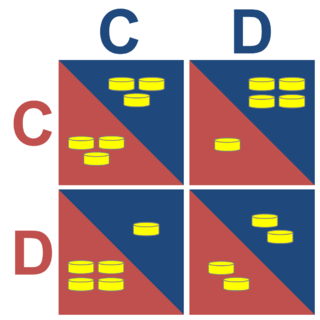
Nice Guys Finish First is a 1986 documentary by Richard Dawkins which discusses selfishness and cooperation, arguing that evolution often favors co-operative behaviour, and focusing especially on the tit for tat strategy of the prisoner's dilemma game. The film is approximately 45 minutes long and was produced by Jeremy Taylor.

Dawkins vs. Gould: Survival of the Fittest is a book about the differing views of biologists Richard Dawkins and Stephen Jay Gould by philosopher of biology Kim Sterelny. When first published in 2001 it became an international best-seller. A new edition was published in 2007 to include Gould's The Structure of Evolutionary Theory finished shortly before his death in 2002, and more recent works by Dawkins. The synopsis below is from the 2007 publication.

The Genius of Charles Darwin is a three-part television documentary, written and presented by evolutionary biologist Richard Dawkins.
"Precambrian rabbits" or "fossil rabbits in the Precambrian" are reported to have been among responses given by the biologist J.B.S. Haldane when asked what evidence could destroy his confidence in the theory of evolution and the field of study. The answers became popular imagery in debates about evolution and the scientific field of evolutionary biology in the 1990s. Many of Haldane's statements about his scientific research were popularized in his lifetime.
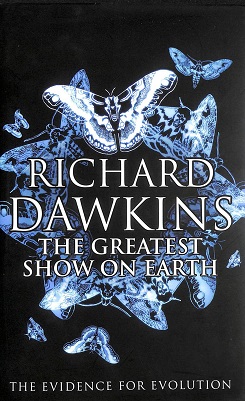
The Greatest Show on Earth: The Evidence for Evolution is a 2009 book by British biologist Richard Dawkins, which was released on 3 September 2009 in the UK and on 22 September 2009 in the US. It sets out the evidence for biological evolution, and is Dawkins's 10th book, following his best-selling critique of religion The God Delusion (2006) and The Ancestor's Tale (2004), which traced human ancestry back to the dawn of life.
Cultural evolution is an evolutionary theory of social change. It follows from the definition of culture as "information capable of affecting individuals' behavior that they acquire from other members of their species through teaching, imitation and other forms of social transmission". Cultural evolution is the change of this information over time.
Reciprocal altruism in humans refers to an individual behavior that gives benefit conditionally upon receiving a returned benefit, which draws on the economic concept – ″gains in trade″. Human reciprocal altruism would include the following behaviors : helping patients, the wounded, and the others when they are in crisis; sharing food, implement, knowledge.


